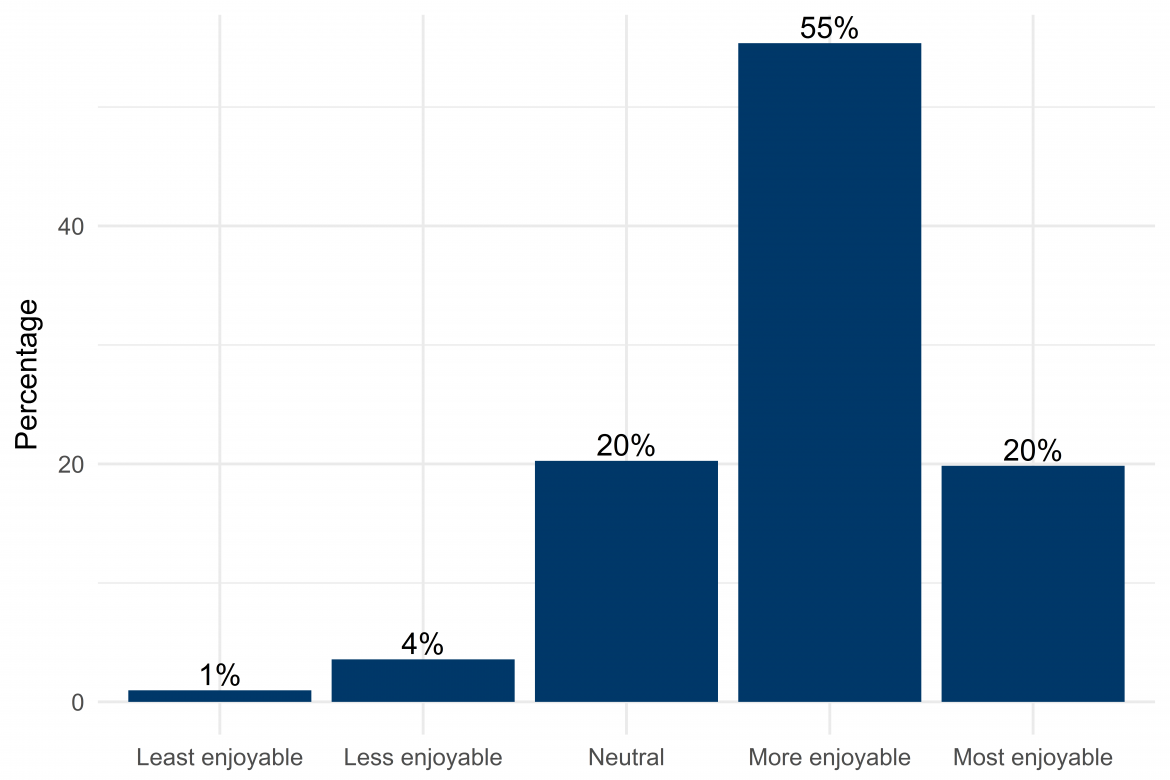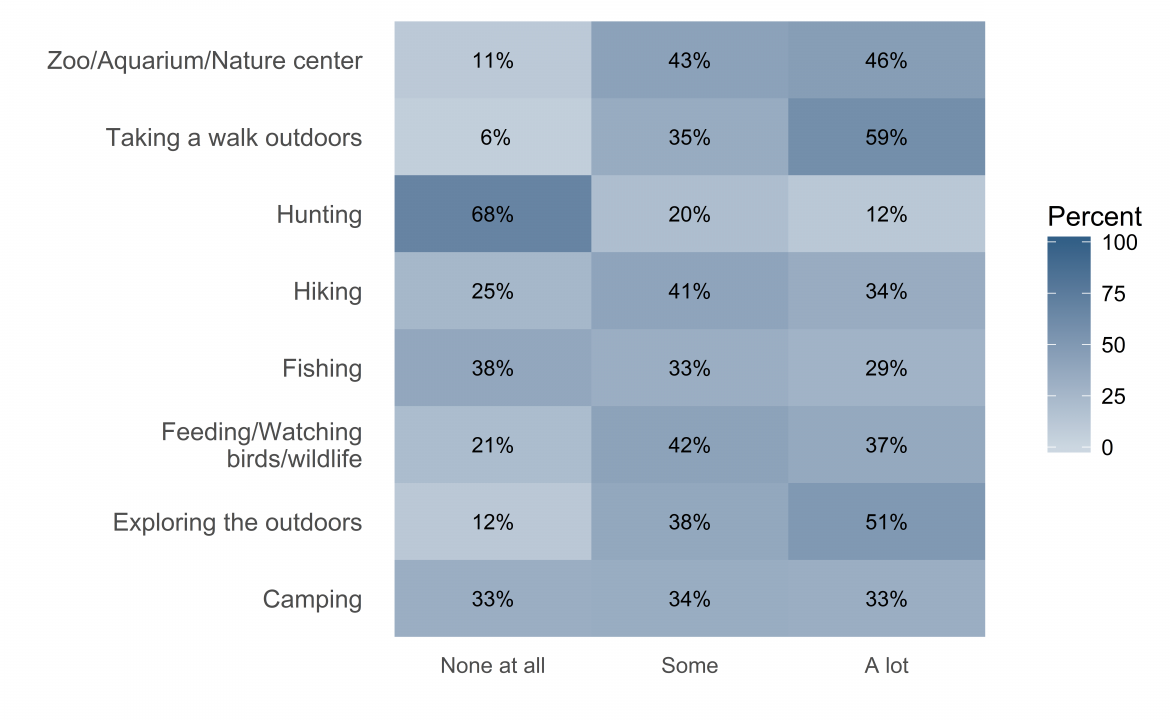What does “nature” mean anyway?
How we as individuals and as a society define what nature even means, and therefore where it is, impacts where and how we can experience it. At times the definition of nature itself may be part of the problem of the growing disconnection. Adults in our research tended to view nature as wild, uncultivated, and set apart from human influences. Viewing and experiencing what respondents considered to be “authentic” nature required, in their minds, significant commitments of time and resources. For example, 82% of adults surveyed thought of national parks as “nature.” Only 52% said the same thing about local parks.
Disconnection from nature
One-quarter of adults are outdoors-oriented in their pastimes, hobbies, and recreational interests.
Question: "In general, would you say your pastimes, hobbies, and recreational interests are...more indoors-oriented ...more outdoors-oriented ...about the same indoors- and outdoors-oriented?"
N=5,550 | Adults 18+
Adult Americans revealed, both in focus groups and the survey, concern about an increasing separation and disconnection from nature in American society as a whole. Five major causes of this disconnection emerged:
- Where people live and work makes it difficult to experience the natural world
- It is difficult to find both time and money to commit to experiences in the outdoors
- In general, research participants felt an increasing isolation from the natural world
- Electronic devices and media are a distraction for many from experiencing the natural world
- People who participated in this research were challenged by perceptions of shifting expectations about what “good” or “normal” connection to nature should even look and feel like
Many were concerned that problems were particularly harmful to younger generations’ ability and opportunity to experience and benefit from the natural world. In particular, many we spoke to and surveyed emphasized three particular barriers to their activities in nature: a lack of time, a lack of financial resources, and a lack of social support (such as friends and family to be with outdoors).
How often do adults get outdoors?
Over 60% of adults report spending 5 or less hours outside in nature each week.
Question: "In a typical week, when weather allows, about how many hours do you spend outside in nature? (Do not include organized sports.)"
N=5,550 | Adults 18+
The majority of adults surveyed reported spending 5 or fewer hours per week outdoors in nature. It is somewhat concerning that most indicated they were satisfied with this degree of contact with the natural environment. Nearly one-half of those who reported spending very little time outdoors in nature each week felt satisfied, although satisfaction did increase among people who reported spending more time outdoors in nature.
American adults are interested in nature and enjoy activities in the outdoors

Three-quarters of American adults say their interests in nature are among their more enjoyable interests or are their most enjoyable interests.
Question: "Would you say nature, wildlife, and the outdoors are ...your most enjoyable interests ...among your more enjoyable interests ...neither more nor less enjoyable than your other interests ...less enjoyable than your other interests?"
N=5,550 | Adults 18+
Nevertheless, adults in our study ranked their interests in nature as among their more enjoyable or most enjoyable interests. One-half said their interests in nature are more than their parents' interests, and 31% said they were the same. More than one-half said their interests in nature were growing with time.
Nature can be appreciated in a variety of ways

Most Americans agree their love of nature is one of their strongest feelings. Even more agree that certain smells and sounds of nature bring to mind some of their happiest memories.
Question: "How much do you agree or disagree with the following statements?"
N=5,550 | Adults 18+
Adults in our survey value nature in a number of ways. They have affection for nature and wildlife, are attracted to the beauty of nature, appreciate symbolic representations of the natural world, and often find spiritual inspiration in the natural world. Those studied believed that understanding the natural world is beneficial to the intellectual development of children. Furthermore, most disagreed with over-exploitation of the natural world and attempts to control it, especially if doing so had negative consequences for wildlife and habitats.
Recognizing the benefits of the natural world

Nearly all Americans consider contact with nature to be moderately, very, or extremely important for their physical health.
Question: "In your opinion, how important is getting outdoors and into nature for helping your physical health?"
N=5,550 | Adults 18+
Most adults recognized that exposure to nature provides them with a variety of benefits to their physical health, psychological well-being, and social growth as individuals and members of communities. They recognized that these benefits occur for themselves personally and for society as a whole.
Interests in nature-related activities

Three-fifths of American adults have strong interest in taking a walk outdoors. One-half have strong interest in exploring the outdoors or visiting a zoo, aquarium, or nature center.
Question: "How would you rate your interest in each of the following activities? ...Camping ...Hiking ...Hunting ...Fishing ...Exploring the outdoors ...Feeding or watching birds or other wildlife ...Visiting a zoo, aquarium, nature center, natural history museum, or botanical garden ...Taking a walk outdoors."
N=5,550. Adults 18+
A number of popular activities in nature included walking, hiking, camping, fishing, visiting zoos and aquariums, exploring the outdoors, wildlife feeding and observation, and gardening.
Social support is key for positive experiences in the natural world
Most adults said influential, memorable, and even routine experiences in nature occurred with friends and family. Adults whose family and friends were making more time for nature tended to spend more time outdoors in nature each week, were more interested in a range of outdoor activities, and supported increasing programs to help Americans enjoy nature, the outdoors, and wildlife.
